牛津深圳版七年级下 6.3 Unit 6 Grammar(课件)
文档属性
| 名称 | 牛津深圳版七年级下 6.3 Unit 6 Grammar(课件) | 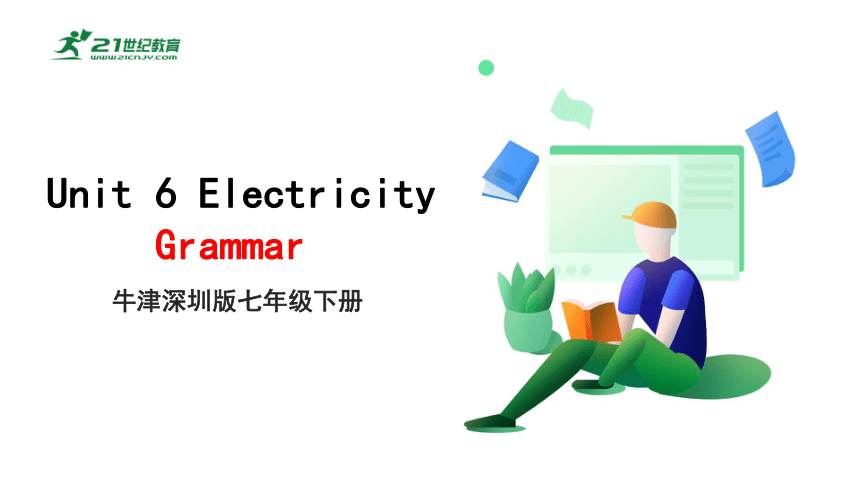 | |
| 格式 | pptx | ||
| 文件大小 | 7.7MB | ||
| 资源类型 | 试卷 | ||
| 版本资源 | 牛津深圳版 | ||
| 科目 | 英语 | ||
| 更新时间 | 2023-04-12 18:48:36 | ||
图片预览

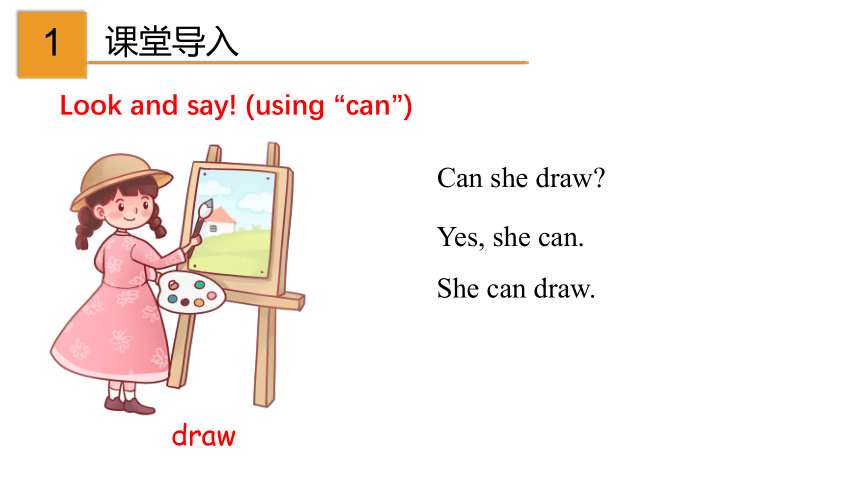
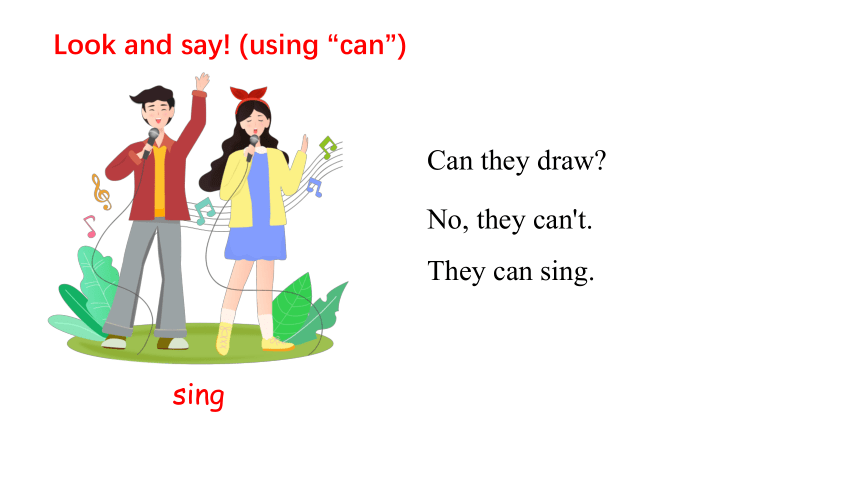
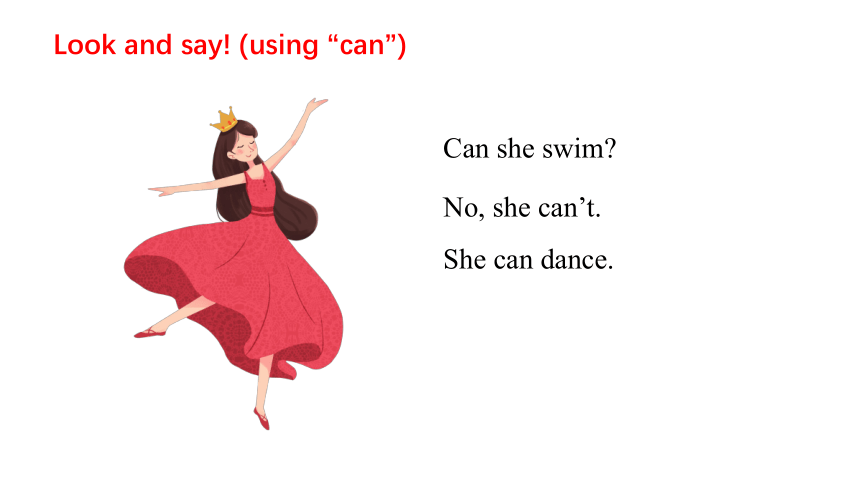
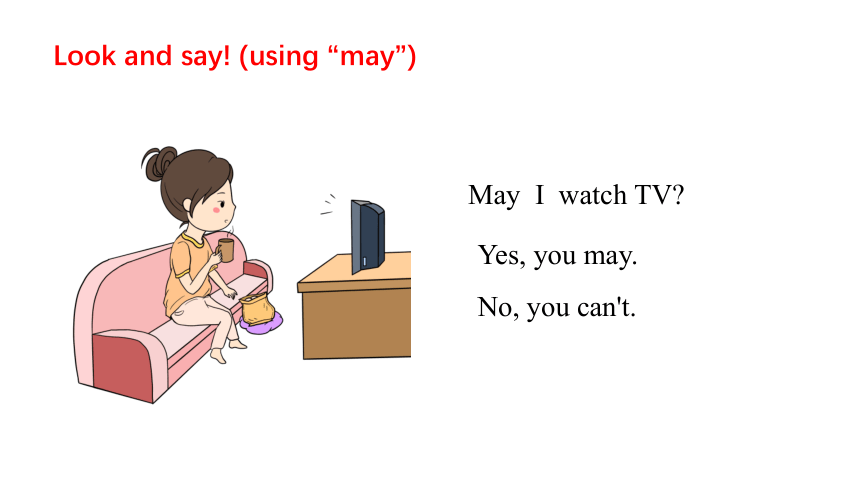
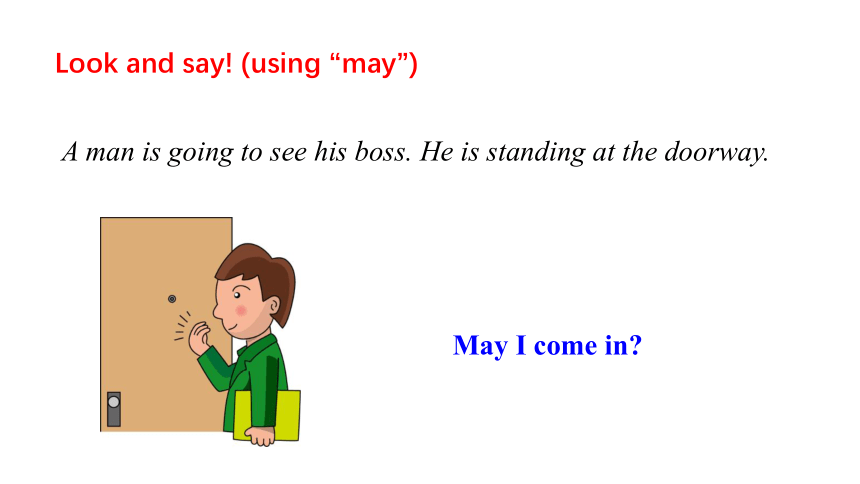
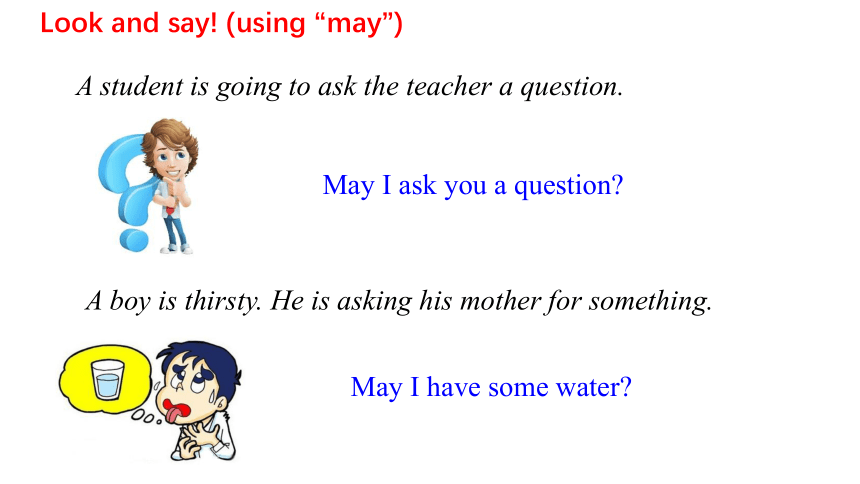
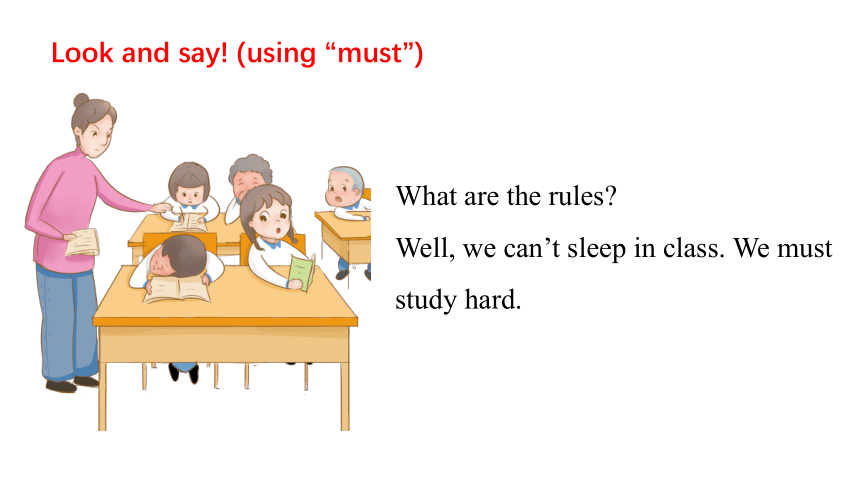


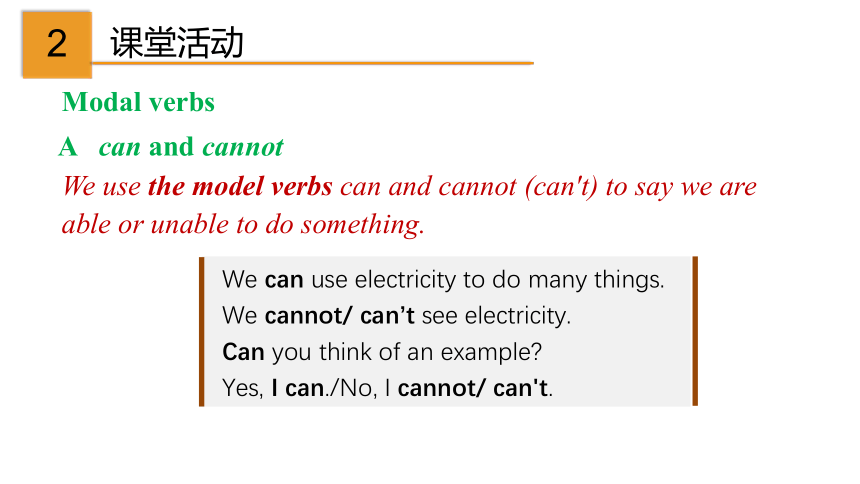
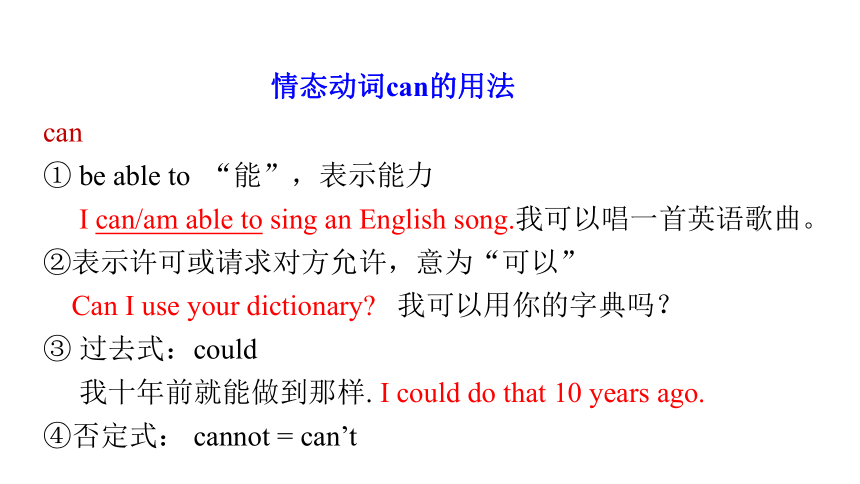
文档简介
(共32张PPT)
Unit 6 Electricity
Grammar
牛津深圳版七年级下册
draw
Yes, she can.
She can draw.
Can she draw
1
课堂导入
Look and say! (using “can”)
sing
No, they can't.
They can sing.
Can they draw
Look and say! (using “can”)
Look and say! (using “can”)
No, she can’t.
She can dance.
Can she swim
Look and say! (using “may”)
Yes, you may.
No, you can't.
May I watch TV
A man is going to see his boss. He is standing at the doorway.
May I come in
Look and say! (using “may”)
A student is going to ask the teacher a question.
May I ask you a question
A boy is thirsty. He is asking his mother for something.
May I have some water
Look and say! (using “may”)
What are the rules
Well, we can’t sleep in class. We must study hard.
Look and say! (using “must”)
What are the rules
Well, we mustn’t run the red traffic lights, we must obey the rules.
Look and say! (using “must”)
What do these signs mean
(You mustn’t smoke here.)
(You mustn’t climb this ladder.)
(You mustn’t swim here.)
(You mustn’t use your mobile phone here.)
Look and say! (using “must”)
A can and cannot
Modal verbs
We use the model verbs can and cannot (can't) to say we are able or unable to do something.
We can use electricity to do many things.
We cannot/ can’t see electricity.
Can you think of an example
Yes, I can./No, I cannot/ can't.
2
课堂活动
can
① be able to “能”,表示能力
I can/am able to sing an English song.我可以唱一首英语歌曲。
②表示许可或请求对方允许,意为“可以”
Can I use your dictionary 我可以用你的字典吗?
③ 过去式:could
我十年前就能做到那样. I could do that 10 years ago.
④否定式: cannot = can’t
情态动词can的用法
⑤could 是can 的过去式,但表示请求许可时,could 和can 不表示时态的区别,只是could 的语气更加委婉,用could 提出的请求要用can来回答。
Peter can speak English.
否定→ Peter can’t/cannot speak English.
一般疑问句→Can Peter speak English
(一般疑问句,提前情态动词)
特殊疑问句→What can Peter speak
Hi and Lo are talking about themselves. What are they saying Read their conversation and then complete the statements below with can or cannot.
1. Hi _____ play football.
2. Lo _____ paint.
3. Hi _____ speak as many languages as Lo.
4. Both Hi and Lo _____ dance.
5. Lo _____ drive a car, but he _____ play chess.
6. Hi ____ swim, but he _____ play the guitar.
can
can
can
can
cannot
cannot
cannot
cannot
B may and may not
We use may and may not to ask for and give permission . We also use can and cannot (can‘t) for the same purpose.
May/Can I use your mobile phone?
Yes, you may/can.
No, you may not/can't.
You may/can turn on the TV.
You may not/cannot play in the kitchen.
情态动词may的用法
may
①表示允许may 表示许可或请求对方允许,意为“可以”,
相当于can。两者的区别在于:表示请求许可时,may更能
表示礼貌或敬意。
— May I watch TV now, grandma
— No, you may not.
②否定式: may not意为“不可以”。
③may构成的一般疑问句及其回答形式如下:
— May I ...
— (肯定回答) Yes, you may / can.
— (否定回答)
No, you may not / can’t /mustn’t.
(注:mustn’t 的语气最强,表示禁止)
Benny: How are you feeling, Daisy
Daisy: Not very well.
Benny: _________ I get you a chair
Daisy: Yes, thanks.
Benny: I’m going out. _____ I borrow your bicycle, Daisy
May
May/Can
Daisy is not feeling well today. Benny is at home with her. Read their conversation below. Fill in the blanks with may or can.
Daisy: Yes, you may. Before you go to meet your friends,
can you come and see the doctor with me
Benny: Yes. I ____. ______ I carry your bag for you
Daisy: Yes, that’s very kind of you, Benny.
I’m ready to go.____ you open the door for me
Benny: Yes, I can.
Daisy: Thanks.
May
Can
Can
C must and must not
We use must and must not (mustn't) to tell people what to do or what not to do.
You must not/ mustn’t do that, Benny!
We must always be careful with electricity.
They must not/mustn’t play near the heater.
情态动词must的用法
must
①表示规定、命令、强制,意为“必须;一定”。
如:You must do your homework first. 你必须先做作业。
You mustn’t smoke here. 你不许在这里吸烟。
②must 的否定式为must not / mustn’t,意为“禁止;不准”
③must 构成的一般疑问句及其回答形式如下:
— Must I ...
— (肯定回答) Yes, you must.
— (否定回答) No, you needn’t.
④辨析must和have to
意义 用法
must “必须;一定” 强调客观上必须做某事
have to “ 不得不;必须” 强调主观上不得不做某事
I must drink more water.
______________________________
______________________________
I must not _____________________
______________________________
______________________________
I must go to bed early.
I must take the medicine on time.
eat cold food.
I must not go out alone.
I must not share cups with others.
Daisy saw a doctor. The doctor told her what to do and what not to do. Help her write down the doctor’s instructions.
drink more water go to bed early
eat cold food share cups with others
go out alone take the medicine on time
3
课堂小结
1.We have learned how to use the modal verb can, may and must.
情态动词后接动词______,没有人称和数的变化, _____单独作谓语,要与后面的______共同作谓语。其否定形式是在其后面直接加______ 。
情态动词can 的用法:表示能力。构成一般疑问句时,需把can 移到______(句首/中)。肯定回答为“Yes,主语+ ______”;否定回答为“No,主语+____________”
not
原形
不能
动词
句首
can
can’t / cannot
Summary
情态动词may 的用法:表示允许。may在表达这个意思时可以与can 互换使用。由may 引起的一般疑问句,其否定回答用_______, ___________ 或 ________ 。表示请求时,could 和
can 不表示时态的区别,只是could的语气更加委婉。
情态动词must 的用法:表示必须/一定。其否定形式mustn’t 表示______。由must引起的一般疑问句,其否定回答要用______ 。
may not
can’t / cannot
mustn’t
禁止
needn’t
一、用本单元所学的情态动词填空。
1. — Kate, you have won the English competition!
— Oh, it _______ be true. I made a lot of mistakes in it.
2. You ________ talk to your grandparents like that. It’s impolite.
3. We _______ wash our hands before meals. It is good for our health.
can’t
mustn’t
must
4. Excuse me, ____ you tell me the way to the nearest park
5. You ________ go with us to the zoo if you want to.
6. I ____ speak Chinese very well, but I ____ speak French at all.
can
can /may
can
can’t
4
课堂练习
二、翻译下列句子。
1. 门锁了。他不可能在家。
The door is locked. He _____ be at home.
2. 我的手表停了,肯定有毛病。
My watch doesn’t work. There _____ be something wrong with it.
3. — 我可以借用你的尺子吗?
— 当然可以。但是你必须明天还给我。
— ____ I borrow your ruler
— Of course. But you _____ return it to me tomorrow.
can’t
must
May
must
三、选择最佳答案填空。
( )1. If you feel tired, you ____ sit on this chair and have a rest.
A. must B. can C. need D. can’t
( )2. — ____ I watch TV now, Mum I finished my homework.
— Yes, you ____.
A. Must, need B. May, can C. Need, need D. May, must
B
B
( )3. He ____ see the words on the blackboard because he sits far away.
A. mustn’t B. may not C. can’t D. needn’t
( )4. — ____ I do all the housework now
— No, you ____. You can do it later.
A. Must, mustn’t B. Must, can’t C. Must, may not D. Must, needn’t
D
C
谢谢
21世纪教育网(www.21cnjy.com)
中小学教育资源网站
兼职招聘:
https://www.21cnjy.com/recruitment/home/admin
Unit 6 Electricity
Grammar
牛津深圳版七年级下册
draw
Yes, she can.
She can draw.
Can she draw
1
课堂导入
Look and say! (using “can”)
sing
No, they can't.
They can sing.
Can they draw
Look and say! (using “can”)
Look and say! (using “can”)
No, she can’t.
She can dance.
Can she swim
Look and say! (using “may”)
Yes, you may.
No, you can't.
May I watch TV
A man is going to see his boss. He is standing at the doorway.
May I come in
Look and say! (using “may”)
A student is going to ask the teacher a question.
May I ask you a question
A boy is thirsty. He is asking his mother for something.
May I have some water
Look and say! (using “may”)
What are the rules
Well, we can’t sleep in class. We must study hard.
Look and say! (using “must”)
What are the rules
Well, we mustn’t run the red traffic lights, we must obey the rules.
Look and say! (using “must”)
What do these signs mean
(You mustn’t smoke here.)
(You mustn’t climb this ladder.)
(You mustn’t swim here.)
(You mustn’t use your mobile phone here.)
Look and say! (using “must”)
A can and cannot
Modal verbs
We use the model verbs can and cannot (can't) to say we are able or unable to do something.
We can use electricity to do many things.
We cannot/ can’t see electricity.
Can you think of an example
Yes, I can./No, I cannot/ can't.
2
课堂活动
can
① be able to “能”,表示能力
I can/am able to sing an English song.我可以唱一首英语歌曲。
②表示许可或请求对方允许,意为“可以”
Can I use your dictionary 我可以用你的字典吗?
③ 过去式:could
我十年前就能做到那样. I could do that 10 years ago.
④否定式: cannot = can’t
情态动词can的用法
⑤could 是can 的过去式,但表示请求许可时,could 和can 不表示时态的区别,只是could 的语气更加委婉,用could 提出的请求要用can来回答。
Peter can speak English.
否定→ Peter can’t/cannot speak English.
一般疑问句→Can Peter speak English
(一般疑问句,提前情态动词)
特殊疑问句→What can Peter speak
Hi and Lo are talking about themselves. What are they saying Read their conversation and then complete the statements below with can or cannot.
1. Hi _____ play football.
2. Lo _____ paint.
3. Hi _____ speak as many languages as Lo.
4. Both Hi and Lo _____ dance.
5. Lo _____ drive a car, but he _____ play chess.
6. Hi ____ swim, but he _____ play the guitar.
can
can
can
can
cannot
cannot
cannot
cannot
B may and may not
We use may and may not to ask for and give permission . We also use can and cannot (can‘t) for the same purpose.
May/Can I use your mobile phone?
Yes, you may/can.
No, you may not/can't.
You may/can turn on the TV.
You may not/cannot play in the kitchen.
情态动词may的用法
may
①表示允许may 表示许可或请求对方允许,意为“可以”,
相当于can。两者的区别在于:表示请求许可时,may更能
表示礼貌或敬意。
— May I watch TV now, grandma
— No, you may not.
②否定式: may not意为“不可以”。
③may构成的一般疑问句及其回答形式如下:
— May I ...
— (肯定回答) Yes, you may / can.
— (否定回答)
No, you may not / can’t /mustn’t.
(注:mustn’t 的语气最强,表示禁止)
Benny: How are you feeling, Daisy
Daisy: Not very well.
Benny: _________ I get you a chair
Daisy: Yes, thanks.
Benny: I’m going out. _____ I borrow your bicycle, Daisy
May
May/Can
Daisy is not feeling well today. Benny is at home with her. Read their conversation below. Fill in the blanks with may or can.
Daisy: Yes, you may. Before you go to meet your friends,
can you come and see the doctor with me
Benny: Yes. I ____. ______ I carry your bag for you
Daisy: Yes, that’s very kind of you, Benny.
I’m ready to go.____ you open the door for me
Benny: Yes, I can.
Daisy: Thanks.
May
Can
Can
C must and must not
We use must and must not (mustn't) to tell people what to do or what not to do.
You must not/ mustn’t do that, Benny!
We must always be careful with electricity.
They must not/mustn’t play near the heater.
情态动词must的用法
must
①表示规定、命令、强制,意为“必须;一定”。
如:You must do your homework first. 你必须先做作业。
You mustn’t smoke here. 你不许在这里吸烟。
②must 的否定式为must not / mustn’t,意为“禁止;不准”
③must 构成的一般疑问句及其回答形式如下:
— Must I ...
— (肯定回答) Yes, you must.
— (否定回答) No, you needn’t.
④辨析must和have to
意义 用法
must “必须;一定” 强调客观上必须做某事
have to “ 不得不;必须” 强调主观上不得不做某事
I must drink more water.
______________________________
______________________________
I must not _____________________
______________________________
______________________________
I must go to bed early.
I must take the medicine on time.
eat cold food.
I must not go out alone.
I must not share cups with others.
Daisy saw a doctor. The doctor told her what to do and what not to do. Help her write down the doctor’s instructions.
drink more water go to bed early
eat cold food share cups with others
go out alone take the medicine on time
3
课堂小结
1.We have learned how to use the modal verb can, may and must.
情态动词后接动词______,没有人称和数的变化, _____单独作谓语,要与后面的______共同作谓语。其否定形式是在其后面直接加______ 。
情态动词can 的用法:表示能力。构成一般疑问句时,需把can 移到______(句首/中)。肯定回答为“Yes,主语+ ______”;否定回答为“No,主语+____________”
not
原形
不能
动词
句首
can
can’t / cannot
Summary
情态动词may 的用法:表示允许。may在表达这个意思时可以与can 互换使用。由may 引起的一般疑问句,其否定回答用_______, ___________ 或 ________ 。表示请求时,could 和
can 不表示时态的区别,只是could的语气更加委婉。
情态动词must 的用法:表示必须/一定。其否定形式mustn’t 表示______。由must引起的一般疑问句,其否定回答要用______ 。
may not
can’t / cannot
mustn’t
禁止
needn’t
一、用本单元所学的情态动词填空。
1. — Kate, you have won the English competition!
— Oh, it _______ be true. I made a lot of mistakes in it.
2. You ________ talk to your grandparents like that. It’s impolite.
3. We _______ wash our hands before meals. It is good for our health.
can’t
mustn’t
must
4. Excuse me, ____ you tell me the way to the nearest park
5. You ________ go with us to the zoo if you want to.
6. I ____ speak Chinese very well, but I ____ speak French at all.
can
can /may
can
can’t
4
课堂练习
二、翻译下列句子。
1. 门锁了。他不可能在家。
The door is locked. He _____ be at home.
2. 我的手表停了,肯定有毛病。
My watch doesn’t work. There _____ be something wrong with it.
3. — 我可以借用你的尺子吗?
— 当然可以。但是你必须明天还给我。
— ____ I borrow your ruler
— Of course. But you _____ return it to me tomorrow.
can’t
must
May
must
三、选择最佳答案填空。
( )1. If you feel tired, you ____ sit on this chair and have a rest.
A. must B. can C. need D. can’t
( )2. — ____ I watch TV now, Mum I finished my homework.
— Yes, you ____.
A. Must, need B. May, can C. Need, need D. May, must
B
B
( )3. He ____ see the words on the blackboard because he sits far away.
A. mustn’t B. may not C. can’t D. needn’t
( )4. — ____ I do all the housework now
— No, you ____. You can do it later.
A. Must, mustn’t B. Must, can’t C. Must, may not D. Must, needn’t
D
C
谢谢
21世纪教育网(www.21cnjy.com)
中小学教育资源网站
兼职招聘:
https://www.21cnjy.com/recruitment/home/admin
